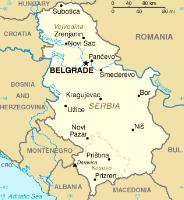The relationship between Russia and Serbia has remained close despite numerous turnovers of leadership in both countries. The continual upkeep of this relationship finds its roots in similar cultural traditions. Both countries boast many of the same Slavic traditions, including the Cyrillic alphabet, Orthodox Christianity and a Slavic brotherhood that differentiates itself from the West. It should come as no surprise then why Russia, despite the breakup of the Soviet bloc, has continued to side with Serbia in its post-Soviet years -- specifically regarding the current controversy surrounding Kosovo, which holds the status of an autonomous territory within Serbia. However, it is not entirely correct to attribute Russia's decision to back Serbia's claims to keep Kosovo under its jurisdiction exclusively to the two countries' shared culture. In fact, Moscow's support of Belgrade may have at least as much to do with Russia's domestic policy as it does with broad ideological sentiments.
Kosovo: A No-Win Situation for Russia

